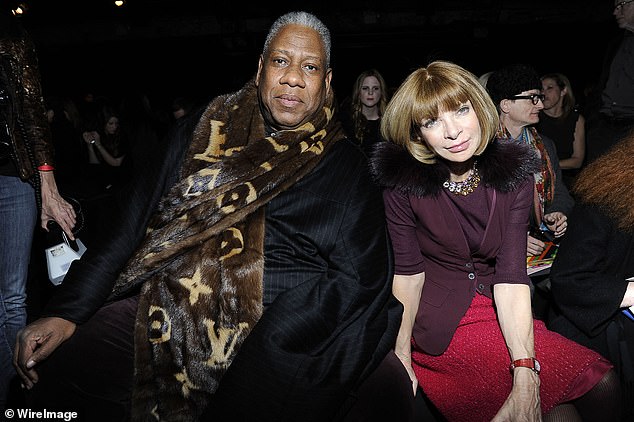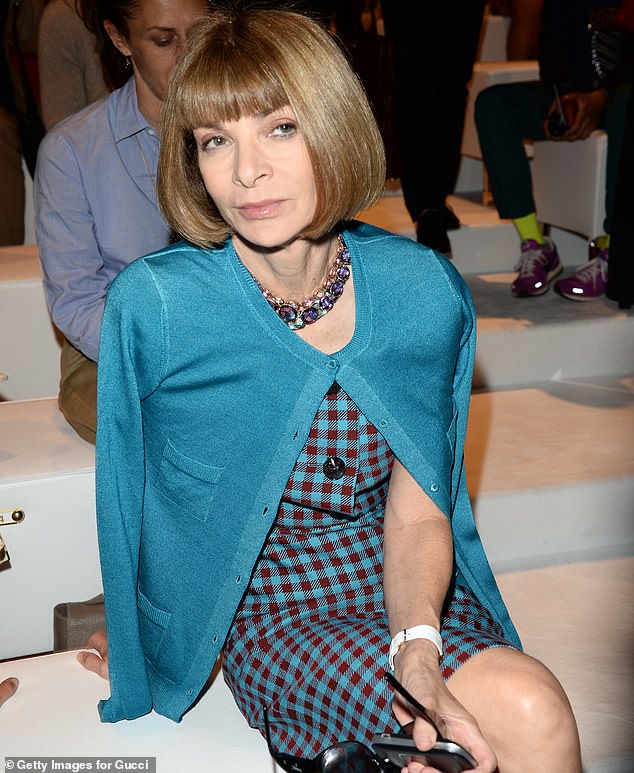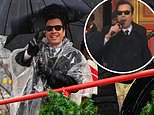Anna Wintour's a colonial broad...her stiletto heel was on my neck: Vogue Editor's former right-hand man Andre Leon Talley says her apology for not promoting black staff is far too little and far too late
- Andre Leon Talley, Anna Wintour's ex-right-hand man, makes explosive claim
- He insists that at one point he was 'the only black person on Anna's staff'
- Talley says he hasn't heard from the Vogue editor since February and never expects to again
A few years may have passed since Andre Leon Talley worked at Vogue with his mentor and nemesis Anna Wintour, but everything about this 6ft 7in fashion celebrity remains absolutely fabulous.
Although working from home in upstate New York, the surroundings could not be more chic. There can’t be many Zoom backdrops like that of his bedroom, now acting as a temporary office, where Talley talks in front of a screen he had made in Paris from a bolt of cotton chintz sourced from Chateau de Vaux-le-Vicomte, an estate near Paris which inspired the gardens at Versailles.
At 10am, he is wearing a £135 straw boater from Lock & Co in London and is swathed in a bold, floral print fabric his friend designer Tom Ford wrangled into an outfit for him.
‘I brought it over from Africa and Tom made it into this beautiful shirt that reaches down to the floor — look,’ he says, standing up to show me the magnificent curtain-like sweep of hem.

Andre Leon Talley, Anna Wintour's former right-hand man has made explosive claims in the aftermath of her recent apology for mistakes made regarding issues of race
He adds that the design is based on a traditional Nigerian outfit called an agbada — but that is as deep as he wants to go when it comes to his African roots. ‘I know I’m a descendant of slaves but I’ve never researched it in any detail. I don’t want to know. I think it would be too painful for me,’ he says.
It is not the only race-related issue he is finding difficult at the moment. Since the death of George Floyd at the hands of Minneapolis police last month, much of the western world has been in foment.
As citizens protest, politicians, celebrities, activists and leaders have been at pains to burnish their own racial equality credentials or point to the failings of others.
Statues of slave owners have been thrown in rivers, television programmes deemed racially intolerant have been wiped from streaming services, while the film Gone With The Wind has been dropped by HBO because it says it depicts ethnic prejudices that ‘were wrong then and are wrong today’.
This worldwide reckoning over racism has even filtered through to the perfumed world of glossy magazines. Perfectly groomed eyebrows were raised this week when Wintour, the steely British-born editor-in-chief of American Vogue, released an apology of sorts in which she admitted mistakes had been made under her 32- year tenure at the fashion bible.
‘It can’t be easy to be a black employee at Vogue, and there are too few of you,’ she said in an email to Conde Nast staffers. ‘I know it is not enough to say that we will do better — but we will — and please know that I value your voices and responses as we move forward.’
Andre Leon Talley, now 71, is dismissive of this mea culpa. ‘At one point, I was the only black person on Anna’s staff,’ he says. ‘This statement, for me, is devoid of sincerity. It comes from the world of whiteness and privilege. Anna probably feels that her apology will be a defining moment but knowing her, it will soon be back to business as usual.
‘She’ll click, clack, clicketyclack down the hall in her Manolo Blahniks and move on. It’s a corporate stance, directed at future advertisers. It’s Anna striking a pose, as the Madonna song says. Why? Because as a powerful businesswoman and head of all Conde Nast editorially she wants to be on the right side of history, not the wrong side.’

Wintour, pictured at Milan fashion week in 2013, admitted mistakes had been made under her 32- year tenure at the fashion bible Vogue
Yet Wintour’s position is understandable. With the Black Lives Matter movement raging in America and emotions running high, many corporate bosses feel they have to explain themselves and their efforts to improve workplace culture to an increasingly critical world.
This week, American civil rights activist Reverend Al Sharpton, addressing George Floyd’s memorial service, called for all whites to ‘get your knees off our necks’. This is something Talley can identify with. ‘I think, metaphorically, Anna Wintour’s Manolo Blahnik stiletto heel was on my neck,’ he says, musing on their 27 years of working together.
‘Anna is a colonial broad. She comes from a British history of colonialism and Empire. Her roots are her Britishness, class systems and divisions. She is entitled and I do not think she will ever let anything get in the way of her white privilege.’
As the former Vogue editor-at-large, Talley, worked alongside Wintour for decades and has described himself as the ‘highest profile black fashion journalist in the world’.
He was the confidant who sat next to her on the front row at fashion shows, the dapper gentleman who accompanied her to the Met Ball in New York in his purple velvet slippers.
‘I wouldn’t have stayed at Vogue as long as I did without Anna being there. She was my biggest ally,’ he said. ‘But Anna Wintour did not make me. I made myself.’ Nevertheless, she was the editor who recognised his talents and rewarded him with a powerful job and in return he was dedicated to her and the magazine.
When their professional relationship soured a few years ago and Wintour ruthlessly excised him from Vogue, Talley was devastated. ‘I’d suddenly become too old, overweight and uncool for Anna Wintour. I don’t think she understands what she does to people,’ he says.
His best-selling new memoir The Chiffon Trenches chronicles the ups and downs of their time together; in it he pays tribute to her generosity but also accuses her of intolerance and thoughtlessness, claiming their working relationship left him with ‘emotional and psychological scars’.
Now he realises that although he was lionised in the fashion world and on Vogue, he belonged without ever quite belonging. Looking back at his time at the magazine, he says although there was never any overt racism, there was always something else, more subtle, that was unconscious, pulsing under the surface.

Talley was left devastated after their professional relationship soured a few years ago and Wintour ruthlessly excised him from Vogue
‘It was systemic without being obvious. I could see that I had my place,’ he says. For example, Talley cites how he was not invited to a dinner given by Wintour for Lord Snowdon, whom he describes as ‘a friend and colleague’ but adds, ‘yet she wanted me at every single fundraiser she ever held for Barack Obama’.
Today, he believes many talented black people were overlooked or marginalised at Vogue under her leadership. ‘If you had a rack of clothing and it was a black designer, that designer wouldn’t get much attention, no matter how talented they were. There was a culture of dismissiveness and I really felt bad about it. How many times could Anna Wintour have hired a black editor and did not?’
For years, Talley says he tried to ‘push back against this culture of whiteness, to navigate through those difficult waters and achieve something’. He was a key supporter of actress and singer Jennifer Hudson, who had a breakout role in the 2006 film Dreamgirls, and helped to get her on the pages of a Vogue power issue the following year.
When Beyoncé’s historic Vogue cover was published in September 2018, Talley wrote an article for the Washington Post about the cultural significance of the cover for the black community. He was crushed when he got no feedback from his white colleagues.
‘They didn’t understand the immense importance of this occasion simply because they are not capable of understanding the world through black eyes,’ he says. He describes an ‘elitist world of white privilege’ where coveted jobs such as editorial assistants always seemed to go to ‘tall, skinny blondes’.
This echoes the experience of Edward Enninful, the Ghanaianborn editor of British Vogue who took over the top job from Alexandra Shulman in 2017. An all-white staff photograph taken during Shulman’s reign seemed to reveal a lack of diversity indicative of a magazine that appealed to a narrow and exclusive subset of the British populace.
Enninful was determined to change that, and inviting the Duchess of Sussex to guest edit the September 2019 issue was deemed a triumph. ‘You paved the way for me,’ Enninful has told Talley, in fond tribute.
Like many African-Americans of his generation, Andre Leon Talley’s early years were tough. While his parents worked in Washington DC, Andre was brought up in America’s segregated South by his grandmother Bennie, a domestic worker.
His grandfather was a sharecropper, which was slavery in all but name. The schools he attended in Durham, North Carolina, were segregated and racism was rife. To someone like Talley, the darker side of America’s shameful racial past is not ancient history, but a lived experience.
He remembers hitchhiking back from a rock festival where he’d seen Jimi Hendrix and being assaulted by an armed highway patrolman for no reason. And having stones thrown at him and being called the N-word by students who saw him on their campus. ‘My grandmother would not allow white people in our house because she mistrusted them,’ he says today.
‘I don’t recall any discussions in my childhood about whether segregation was normal or not. It was just the way we lived. We were proud people. We went to church every Sunday and that was where we got our strength from.’
He discovered his first copy of Vogue aged 12 in the Durham public library, the only public building in town that was not segregated. This ignited a lifelong love affair with fashion. It ended up with him working at the magazine alongside the most powerful woman in the global fashion industry.
Andre and Anna made quite a pair, feted and feared in equal measure; she in her trademark bob and dark glasses, he in his voluminous kaftans and buckled shoes. His friend Karl Lagerfeld would make him navy silk capes, while designer Nicolas Ghesquière sewed him emerald green ones, paired with matching boots. He owns eight crocodile coats custom-made for him by Miuccia Prada and heaven knows how many lambs were sacrificed in the construction of his majestic Fendi shearling overcoat.
He collects Louis Vuitton luggage and keeps it gleaming with regular applications of yacht varnish, he hasn’t yet met a Hermes box he could bear to throw away and he put up with Naomi Campbell’s tantrums so he could fly on her private jet.
In short, he is just as susceptible to the lure of luxury as any young man from an impoverished background who got himself a scholarship to an Ivy League university, studied French literature and always knew the difference between a Fortuny pleat and a fold.
Yet even at the peak of his career, Talley felt an outsider. In The Chiffon Trenches, he reveals other incidents of racism. When he was working in Paris for Women’s Wear Daily, he was called ‘Queen Kong’ by the fashion set, a slur coined by someone at Yves Saint Laurent.
He also recounted how a male editor told him the rumour was that he was sleeping with every designer in Paris. ‘I got my success on my looks and my knowledge, not my sexual appeal,’ he wrote.
‘Am I supposed to be a buck, servicing sexually everybody in Paris? That was a very racist thing.’ Andre lives alone in suburban New York and seems never to have had a significant other in his life. He was sexually abused as a child, first by a neighbour, then by the older brothers of friends; a trauma which put him off intimate relationships for life.
Instead of love there was Anna Wintour, an imperious void into which he could project his passion and affections. For years, in many ways, the feeling was mutual. ‘Anna fought for me, intervened for me in my weight battles, got me an interest-free loan to buy my grandmother a brand new house in 1988 and showed me deep loyalty and friendship,’ he says.
Despite this, it seems unlikely the friends will reconcile any time soon. Allies of Wintour will find the ‘colonial’ insult particularly unforgiveable, while only time will tell if Wintour can survive a social justice movement determined to dismantle publishing empires built on elitism and exclusion.
Talley is determined her words must lead to improvement. ‘I hope there will be more space in the fashion world for black people. And I hope there will be more accountability now. Anna can’t just apologise in a statement — she has to take action. So let’s see what that change is going to be at Vogue.’
One thing is for sure — he is not going to hear about it first hand. ‘I haven’t heard from Anna since February and don’t expect to,’ he admits.
‘I’m sure she’s probably erased me from her world, her cellphone and her email directory. She’s never going to call me or acknowledge me again — but I only wish her the best, as she wishes me the best.’ Despite everything that has happened, Andre Leon Talley still looks to the future with hope.
Amid his cache of capes and polished trunks, deep into the twilight of his fairytale life, he somehow continues to thrive.
‘I survived it all and I’m optimistic and positive,’ he says, straw boater at a rakish angle and face mask at the ready, as he prepares to greet another day on fabulous Planet Talley.
Most watched News videos
- Men in balaclavas brag about sordid stunt with Bonnie Blue
- Bonnie Blue's mum recalls cleaning up after her 'gang bangs'
- EasyJet passenger launches horrible racist rant in front of families
- Musk and Bezos among the guests at Trump's pre-inauguration dinner
- 'MAGA' Elon Musk takes the stage at Trump victory rally with X
- Emotional moment released hostages reunite with their families
- Trump delivers remarks at pre-inauguration dinner with Melania
- New Hamas propaganda clip shows hostages being given gift bags
- Watch Village People perform YMCA as Trump dances along
- First group of hostages released by Hamas: How the day unfolded
- Nine's Tony Jones under fire for Novak Djokovic chant on live TV
- Bonnie Blue shares her worst experience after sleeping with 23 men





























































































































































































































